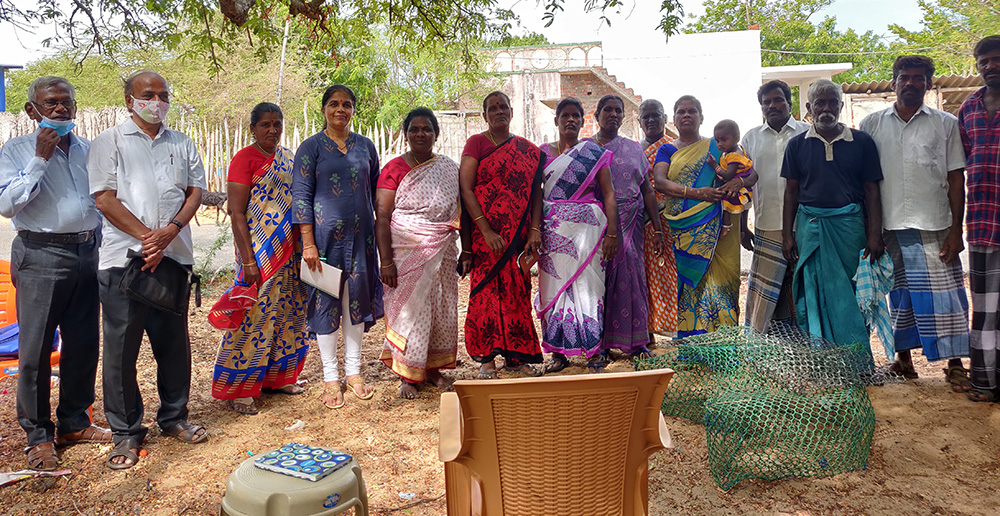Seventh Operational Phase of GEF Small Grants Programme in India
SGP India Website Click Here

Building capacities of local communities to take collective action for conservation and sustainable development are the key areas of focus for the project.
The Ministry of Environment, Forest and Climate Change, Government of India, in collaboration with UNDP is implementing Global Environment Facility (GEF) Seventh Operational Phase of the Small Grants Programme in India (SGP-OP7). The Energy and Resources Institute (TERI) has been appointed the National Host Institution for executing this project.
The project aims to build capacities of local communities to take collective action for conservation and sustainable development thereby generating global environmental benefits.
Thematic Areas
Biodiversity
Climate Change
Land Degradation
Geographic Focus
| Region | State | Intervention Landscape District |
|---|---|---|
| Central semi-arid | Madhya Pradesh | Barwani |
| Damoh | ||
| Chhatarpur | ||
| Indian Coast | Maharashtra | Sindhudurg |
| Ratnagiri | ||
| Tamil Nadu | Virudhunagar | |
| Ramanathapuram | ||
| North East | Assam | Barpeta |
| Baksa | ||
| Udalguri | ||
| Dhubri | ||
| Meghalaya | Ri Bhoi | |
| West Khasi Hills | ||
| East Khasi hills |
Project Brief
The Seventh Operational Phase (OP7) of the GEF Small Grants Programme in India aims to enable communities and organizations in some of the most vulnerable and least developed areas of India to take collective action through a participatory landscape planning and management approach aimed at enhancing socio-ecological resilience through innovative livelihood options producing local and global environmental benefits. Building upon achievements and lessons learned during earlier operational phases, the OP7 project is focused on three regions in the country:
(1) Highlands of the North East
(2) Central semi-arid region of India
(3) Indian coastal regions
Globally significant biodiversity in these regions face a variety of threats ranging from land use changes in natural habitats to overexploitation of natural resources, proliferation of invasive species and climate change. Moreover, poor land management practices and other factors, including climate change, have led to extensive forest, land, and coastal zone degradation which results in diminished ecosystem services, exposing marginalised communities to lower agriculture yields & food supplies, and exacerbating vulnerability to the impacts of climate change. Many of the rural communities in the target regions lack access to commercial and clean energy, as compared to their urban counterparts which is due to a lack of infrastructure, low levels of affordability, and limited awareness & technical know-how. The project strategy addresses the threats and barriers in the target regions to generate multiple benefits for biodiversity, climate change, land degradation, and the well-being of local communities through participatory, integrated land and resource management approaches implemented across socio-ecological production landscapes and seascapes.
Project Components and Outcomes
Component 1: Resilient landscapes for sustainable development and global environmental benefits
Outcome 1.1: Globally significant biodiversity protected, and ecosystem services enhanced through improved community-led management practices and systems
Outcome 1.2: Appropriate low emission, efficient and clean technologies and solutions adopted at scale
Component 2: Enhancing sustainability through participatory governance and upscaling of best practices
Outcome 2.1: Community institutions strengthened for participatory governance to enhance socio-ecological resilience
Outcome 2.2: Strengthened capacities and systems for upscaling of successful community initiatives
Component 3: Monitoring and evaluation
Outcome 3.1: Sustainability of project results enhanced through participatory monitoring and evaluation
The SGP OP7 project strategy is predicated on strengthening the socio-ecological resilience through developing skills, capacities & resources required to conserve and restore critical ecosystems, sustainably utilize ecosystem services, improve the sustainability & productivity of agro-ecosystems and deploy clean solutions in the three intervention landscapes.
MoEF&CC, UNDP & TERI hold Regional Inception Workshops under SGP-OP7

As part of GEF-UNDP Small Grants Program, three Regional Inception Workshops were organized in Ratnagiri, Maharashtra (22nd October), Guwahati (20th September), Chennai (13th September) and Bhopal (8th September). The inception workshops saw the participation of around 200 NGOs, officials from UNDP and MoEF&CC, State Governments, District Collectors, and experts from various thematic areas. The Small Grants Programme is a global grant-making programme funded by the Global Environmental Facility (GEF) and implemented by UNDP.
The GEF Small Grants Programme provides financial and technical support to community projects that provide global environmental benefits while enhancing the lives of local communities. Under the overall guidance of the Ministry of Environment, Forest and Climate Change (MoEF&CC), the Government of India and the United Nations Development Programme (UNDP), The Energy and Resources Institute (TERI) is implementing the GEF Seventh Operational Phase of the Small Grants Programme in India (SGP-OP7).
The SGP-OP7 aims to provide financial and technical support to local communities, community-based and civil society organizations, mostly in poor and often remote areas, for initiatives that conserve and restore the environment while enhancing people’s livelihoods and wellbeing.


The three thematic areas of SGP for this cycle include: Biodiversity, Land Degradation, and Climate Change. It is being implemented in the three regions of the country: (a) Central Semi-arid region of India (b) Indian coastal regions and (c) Highlands of the Northeast.
Delivering the opening remarks at the first Regional Inception Workshop, Dr Vibha Dhawan, Director General, TERI noted “Small programmes bring organizations with diversity on board and show us what is needed at the grassroots. Their participation is essential to address the global problems of climate change and resource depletion”.
